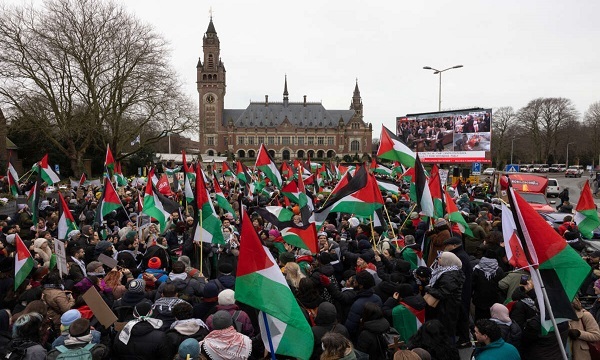Israel's presence in Palestinian territories is illegal
TEHRAN (defapress) - On Friday, the International Court of Justice said “Israel’s continued presence in the occupied Palestinian territory is unlawful”, adding that the regime “is under an obligation” to end it “as rapidly as possible.”

Israel occupied the West Bank, Gaza Strip, and East al-Quds, areas Palestinians want for a future independent state, in a 1967 war.
The 83-page advisory opinion read out by court President Nawaf Salam outlined a wide list of policies that it said violated international law, including the building and expansion of Israeli settlements in the West Bank and east al-Quds.
The report further clarified that the Palestinian people, recognized under the Oslo Accords between "Israel" and the Palestine Liberation Organization, have the right to self-determination.
According to Salam, the ICJ's advisory opinion is based on the premise that the Palestinian territories are occupied lands and the occupied Palestinian territories in Gaza, the West Bank, and al-Quds represent contiguous and sovereign lands that must be respected.
The ICJ also considered that "Israel" exercised its authority as an occupying power contrary to international law, affirming that the prolonged occupation of Palestinian territories does not change their legal status.
Regarding the current war against Palestine's Gaza Strip, the ICJ President indicated that the current advisory opinion does not include the war that erupted in Gaza in October 2023.
Salam confirmed that the court considers Gaza part of the territories occupied by "Israel" in 1967, noting that "Israel" has retained its authority over the Strip, particularly monitoring its air, sea, and land borders.
Additionally, Salam emphasized that the Israeli occupation's "duties" in the occupied territories are subject to the 1959 treaty on the treatment of civilians during war, and the occupying forces are obliged to ensure the delivery of water to the inhabitants of the occupied areas.
He also described the Israeli occupation's use of natural resources in the occupied Palestinian territories as a violation of its obligations under international law, stressing that "Israel" must compensate for the damages caused by its occupation of Palestinian territories.
On the international level, the ICJ confirmed that all states have an obligation not to recognize the Israeli occupation of Palestinian territories and noted that everyone must distinguish between "Israel" and the occupied Palestinian territories.
The President of the ICJ, Nawaf Salam, also confirmed that the court is "not convinced" that the expansion of sovereignty in the West Bank and al-Quds is "justified," and considers Israeli settlements in the West Bank and al-Quds a violation of international law.
In this context, Salam stated that the ICJ sees "Israel" treating East al-Quds as part of its territory and that "Israel" applied its laws there after 1967, stressing that the Israeli occupation is obliged to end its presence in the occupied Palestinian territories as soon as possible.
The ICJ President discussed the expansion of settlements in the West Bank, explaining that the transfer of Israeli settlers into the West Bank or East al-Quds contradicts Article 49 of the Geneva Convention and that "Israel’s" confiscation of Palestinian lands and granting them to settlers is neither temporary nor in compliance with the Geneva Convention.
The ICJ emphasized that the expansion of settlements into the West Bank and al-Quds and the construction of the separation wall serve to reinforce the occupation authorities and emphasized that all new settlement activities must be halted.
Salam also pointed out that "Israel" has accelerated the annexation of lands and the establishment of new settlements in the West Bank, amounting to more than 24,000 settlement units. The court believes that the control over occupied territories should be temporary, and its continuation amounts to an illegal annexation of large parts of those territories.
Salam then reviewed the number of Palestinian units demolished by the occupation in recent years, confirming that approximately 11,000 Palestinian units have been demolished since 2009 under the pretext of lacking permits. He also pointed out that Israel's practices have led to the expulsion of Palestinians from the occupied territories, especially Area C in the West Bank.
